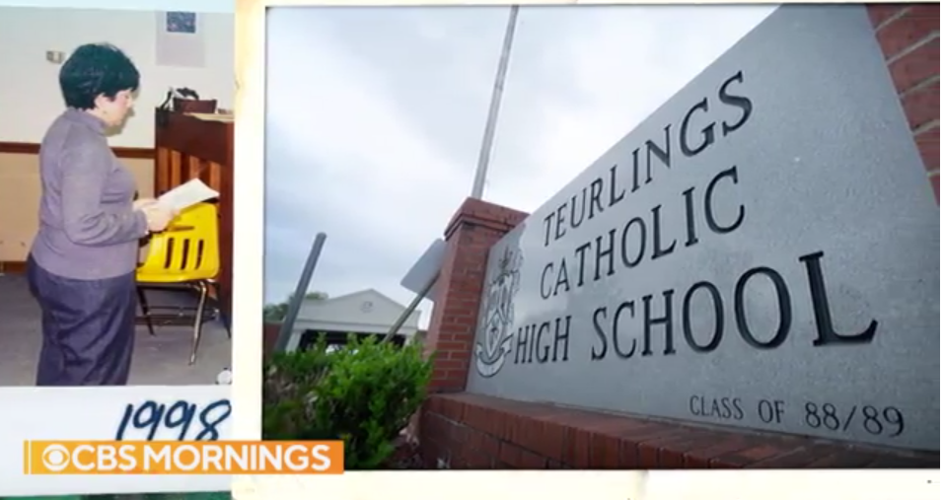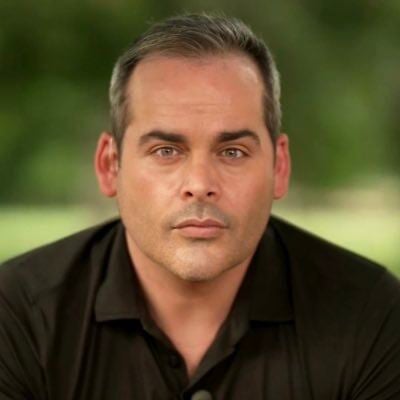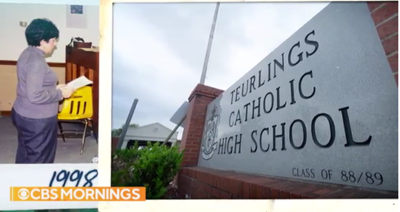I love Louisiana.
I was born and raised in Lafayette, in the heart of Cajun country, and I take great pride in telling Louisiana’s stories to all of America whenever I have the opportunity as lead national correspondent for CBS Mornings. It is my dream job. But I never thought it could happen while being openly gay. And it would not have happened without Josette Surratt.
I recently returned to the Bayou State to tell our very personal Louisiana story to our CBS audience. But the story took an unexpected, and painful, turn.

David Begnaud
Josette Surratt was my English teacher when I was a freshman at Teurlings Catholic High School in the late 1990s. It was a vulnerable and lonely time in my life. I was struggling to find my way. But she saw something inside me. My potential. And she helped to unlock it. She became my speech coach, mentor and dear friend.
The trajectory of my life changed one day when Ms. Surratt, as I still affectionately and respectfully call her, looked me directly in the eyes and asked me a question that stopped me in my tracks. “What are you running from?”
The answer lay deep in my childhood. I was running from myself: a gay kid with Tourette Syndrome who endured unspeakable bullying. I was hiding inside an invisible fortress I'd built to try to protect myself. That day, with that question, Ms. Surratt slowly began tearing down the walls and letting me out to become the person I was meant to be and am today.
Earlier this year, as I was preparing Ms. Surratt's story for CBS News, little did I realize I would again face anti-gay discrimination. The perpetrator this time was not a student but the head of the school, at my alma mater.
Ms. Surratt was genuinely thrilled to be the subject of the story. After decades of teaching, she was now director of faith formation at Teurlings and soon to retire. Given all we'd been through together, it seemed like a full-circle moment for us and a great way to recognize her extraordinary career.
We would, of course, need pictures of Ms. Surratt. So at my request, she asked school leaders for permission to shoot video on campus.
Surratt would later tell me, in a voice that seemed to be hiding something, that we would be allowed to record at the school, but only after hours, when the students were gone. The administrators, she said, did not want us to disrupt the school day by walking around with a camera crew. That seemed reasonable, so I said, "no problem."
But when it came time to finalize details about my interview with Ms. Surratt, she said it might be best to do it off campus. That seemed odd, but at the time I didn’t think to press the issue. I found a place for the interview. The story aired. And we moved on.
Months later, I got a phone call that took me right back to my childhood at the school where I'd often felt like an outcast. The caller told me the real reason the school restricted my video recording was that the school’s chancellor, the Rev. Kyle White, was concerned that allowing me on campus might negatively affect the image of the Catholic school and suggest that it approved of my sexuality. White, the caller said, didn’t want students to get the impression that being gay is OK.
The caller said White was also concerned that the interview with Ms. Surratt would focus on my sexuality, which might cause trouble for the school. I did talk about growing up gay and how Ms. Surratt had created a safe space for me to be myself while balancing my faith, studies and extracurricular activities. But the story was as much about this extraordinary teacher and human being as it was about me.
Shortly after the piece aired, I was told White actually felt the story was “well done.” So I was surprised later to learn of his concerns about me. I sought a meeting with him. He referred me to the communications director for the Diocese of Lafayette, saying all media requests must go through that office. I told him that this was actually regarding a personal issue. He never responded again.
My concern, as a proud alumnus, is not for myself. It is for the students of Teurlings Catholic High School — straight, gay or anything else — if the school is creating an environment in which gay students are treated like outsiders and straight students are led to believe that this is how the church would have it.
It is not.
Throughout his pontificate, Pope Francis has welcomed members of the LGBTQ+ community into the Church, speaking about us in ways that foster inclusion and love. Just a month ago, he changed long-standing Vatican policy and, for the first time, allowed priests to bless same-sex couples. I am deeply heartened by what the Pope has done in both word and deed.
Seven years ago, Ms. Surratt told me the school wanted to start the David Begnaud Scholarship. It would be awarded each year to a student who exemplified courage during his or her time at Teurlings. I was deeply touched. I donate money every year to be given to the chosen student, along with the recognition. It’s become a tradition.
I don’t know how White feels about the scholarship, or if he’ll allow it to continue after Ms. Surratt retires, but I do know this: The Bible from which White preaches says there is a time for everything.
Three decades ago, the board of pastors decided it was time for the Teurlings Rebels sports teams to stop using the Confederate battle flag, widely considered to be a symbol of racism, as a mascot of the school.
It is now past time for the school to address anti-gay discrimination.
I am asking for school leaders to have courage.
It is a time to heal. And a time to love.
I love Teurlings Catholic High School.
And, I dearly love my Louisiana.
David Begnaud, a native of Lafayette, is the lead national correspondent at CBS Mornings, CBS News, where he has reported since 2014. The opinions expressed in this column are his own personal views.



